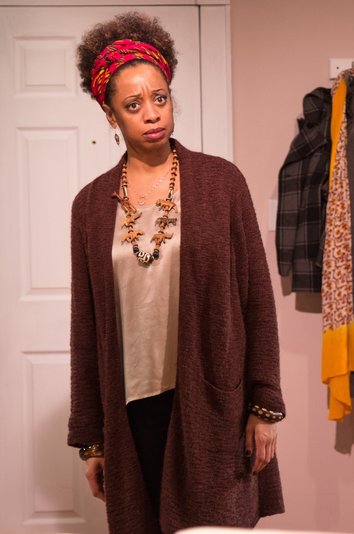 Jammie Patton. Lindsay Raymondjack Photography.
Jammie Patton. Lindsay Raymondjack Photography. Drea is like a ball park frank but with Grey Poupon artisanal cheese on top.
Are there any connections that you see between you and your character?
Absolutely! Drea's an artist. I'm an artist. She likes sophisticated women. I love sophisticated women. Drea also seems to have a natural curiosity about the world and people around her and isn't afraid to ask questions. I value this quality in others as well as myself. What would this world be if we lost our curiosity... our desire to investigate? Pretty boring if you ask me!
What do you like most about this play? Do you have a favorite line?
I like the fact that there are no easy answers in The Call. Tanya Barfield doesn't allow the conflict to be packaged nicely and wrapped up with a pretty bow. The characters are messy, vulnerable and complex. Sometimes contradictory. I also appreciate that the dialogue is written in a way that we actually speak in "real life". In the real world we don't always finish our sentences. Sometimes we use our hands, face or body language in lieu of actual words. We also don't always politely wait for others to stop speaking before we chime in with our own thoughts. The playwright has made a clear point of writing in an overlapping rhythm with regards to the dialogue and it's also very clear in those moments when the dialogue does not overlap. Tanya's like a jazz musician in this way. Guiding our attention with rhythm. This technique, coupled with the unconventional alleyway staging will help create an intimacy that will bring the audience into the milieu of these characters' story in a way that feels real and voyeuristic.
Favorite line is when Alemu says with regards to Africa, "The continent, not the country. (He laughs) Humor: it doesn't translate."
And then again later when Alemu says, "Ah. It's 'for Africa,' the entire continent." These lines are brilliant and Tino delivers them brilliantly!
How would you describe the play to our audience?
The Call is an honest glimpse into a couple's journey through the not so warm and fuzzy process of adoption and what happens when people stop being polite and start confronting their own desires, insecurities and basic need to contribute SOMETHING good to the world.
What would you like them to leave thinking or talking about?
It would just be nice if folks are talking and or thinking. I believe that's the responsibility of storytelling. Not to tell the audience WHAT to think about or how to think about it. Just to get them thinking. Maybe spark new dialogue that they didn't have the desire or even courage to have before. I also hope they leave the theater thinking "Boy, that Jammie Patton was really good!" That is my hope for the entire production. I feel pretty good about my hopes. This team is rocking! 😊



